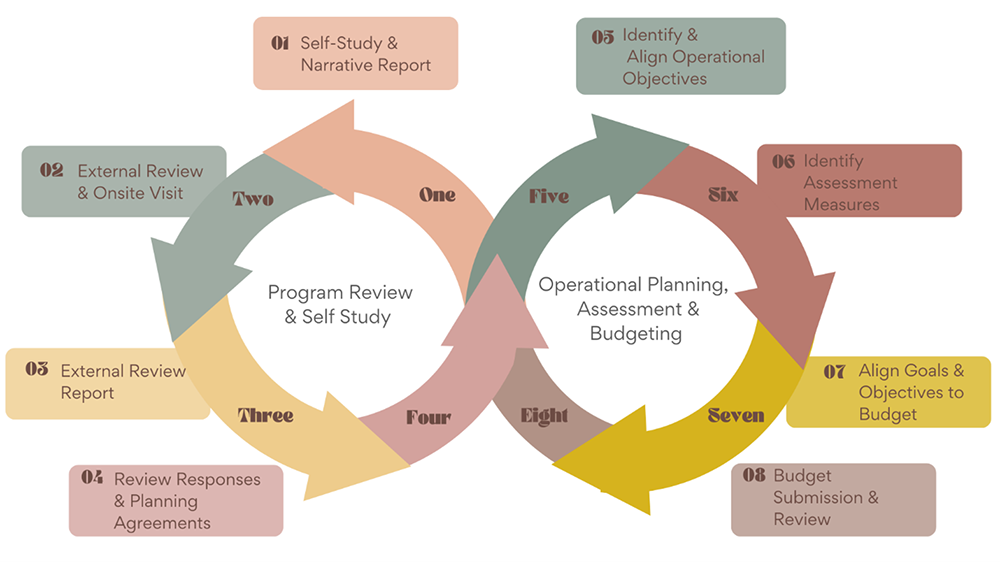Spelman’s Program Review is a four-step process that involves: 1) a program self-study and completion of the self-study narrative; 2) an external review and Onsite visit by the external review team which culminates in an External Review Team Report; 3) review responses and follow-up from the program and the Provost; and 4) strategic planning, implementation and continuing program review and enhancement.
Visit Process Overview for a summary of each step.
Philosophy
Spelman College reviews each instructional unit (department, program, center) every five to seven years, in accordance with guidelines that the College has established in collaboration with the Faculty Council. The academic review process provides an opportunity for each unit to reflect, self-assess, and plan with the goal of creating optimal learning experiences for students and exceptional environments for faculty and staff to thrive. When done effectively, the program review process not only supports continuity in long-term program planning but also supports the institution’s strategic and operational planning process.
The first review for new academic programs (i.e., degrees/majors and minors) is required five years after implementation. The date for the five-year review is set at the time of initial program approval and implementation. After the initial five-year review, continuing academic programs must complete a program review at least once every five to seven years.
Objectives
The central question addressed in the review is whether the department, program, or center is fulfilling its evolving goals, in the context of the mission and goals of the College. The focus is on teaching effectiveness, continuous enhancement of student learning, and ongoing faculty development. As important, the program review process provides the department, program, or center an opportunity to address any areas needing improvement and support. The most useful program reviews are reflective, self-critical, and visionary, providing recommendations to improve operations that are reviewed and implemented when appropriate and feasible. The more effective program review processes also recognize the timeliness of the process and recognize that delays impact overall program planning, assessment and advocacy opportunities.
In essence, the objective of the program review is to answer three questions:
Who Participates in Academic Program Review?
Program review engages many constituents and areas across the campus including:
Institutional Effectiveness
350 Spelman Lane, SW
Atlanta, GA. 30314
404-270-5025
mburnett@spelman.edu
Mon. - Fri. | 9 a.m. - 5 p.m.
Spelman’s Program Review is a four-step process that involves: 1) a program self-study and completion of the self-study narrative; 2) an external review and Onsite visit by the external review team, which culminates in an External Review Team Report; 3) review responses and follow-up from the program and the Provost; and 4) strategic planning, implementation and continuing program review and enhancement.
Ordinarily, the program review begins in September and is integrated with the operational planning and assessment cycle allowing departments to strategically align the Self-Study with planning and budgeting milestones. This strategy allows programs to arrive at strategies for improving the overall operations of the departments. The first three steps of the process conclude by September of the following year; however, the fourth step is an ongoing and iterative process that supports program planning and continuous program improvement.
Externally accredited programs may conduct their Program Reviews on a cycle that is consistent with their external accreditation cycle.
Delays in the Program Review should be determined in conjunction with the Office of the Provost (Vice President of Institutional Effectiveness and the Provost).
Programs not completing a review within a 10-year span may experience delays in substantive program revisions until their program review is completed.
Academic Program Review and Self-Study and Operational Planning, Assessment and Budgeting Cycles1

| Program Review and Self Study | |
| 1st Cycle | Self-Study and Narrative Report |
| 2nd Cycle | External Review and Onsite Visit |
| 3rd Cycle | External Review Report |
| 4th Cycle | Review and Responses Planning Agreements |
| Operational Planning, Assessment and Budgeting | |
| 5th Cycle | Identify and Align Operational Objectives |
| 6th Cycle | Identify Assessment Measures |
| 7th Cycle | Align Goals and Objectives To Budget |
| 8th Cycle | Budget Submission and Review |
Spelman College is accredited by the Southern Association of Colleges and Schools Commission on Colleges to award baccalaureate degrees. Contact the Southern Association of Colleges and Schools Commission on Colleges at 1866 Southern Lane, Decatur, Georgia 30033-4097 or call 404-679-4500 for questions about the accreditation of Spelman College.
It's time to explore our beautiful campus! Sign-up today, bring your family, and let us show you what will make Spelman College your home away from home!
